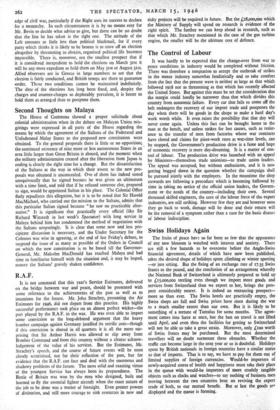Swiss Holidays Again
The fruits of peace have so far been so few that the appearance of any new blossom is watched with interest and anxiety. There are still a few hazards to be overcome before the Anglo-Swiss financial agreement, details of which have now been published, takes the desired shape of holidays spent climbing or winter sporting —or just sitting. But the fixing of an exchange rate of 17.35 Swiss francs to the pound, and the conclusion of an arrangement whereby the National Bank of Switzerland is ultimately prepared to hold up to £15,00o,000 sterling even though we import more goods and services from Switzerland than we export to her, brings the pros- pect considerably nearer. It is indeed an entrancing prospect— more so than ever. The Swiss hotels are practically empty, the Swiss shops are full and Swiss prices have risen during the war to a much smaller extent than our own. But it is likely to be something of a torture of Tantalus for some months. The agree- ment comes into force at once, but the ban on travel is not lifted until April, and even then the facilities for getting to Switzerland will not be able to take a great strain. Moreover, only £roo worth of Swiss francs may be purchased. But the most determined travellers will no doubt surmount these obstacles. Whether the traffic can become large in the next year or so is doubtful. Holidays spent by British nationals in foreign countries have a similar status to that of imports. That is to say, we have to pay for them out of limited supplies of foreign currencies. Would-be importers of newly-acquired stores of health and happiness must take their place in the queue with would-be importers of more crudely tangible objects such as clocks and watches—to say nothing of business men moving between the two countries bent on reviving the export trade of both, to our mutual benefit. But at last the goods are displayed and the queue is forming.


























 Previous page
Previous page